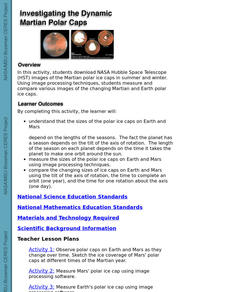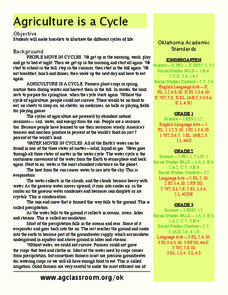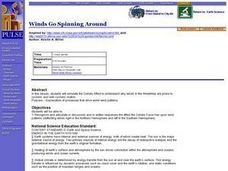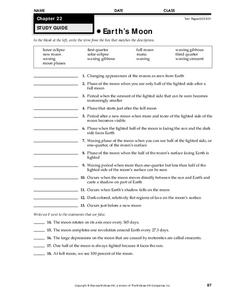Curated OER
Seasons
Students identify and define the vocabulary words: summer, spring, fall, and rotation. They describe how the earth's rotation affects the seasons. Students match appropriate clothing with each season. They discuss why a particular...
Curated OER
I Can See and Feel the Change in the Seasons
Students use their senses to investigate the changes in the seasons. They discuss how the Earth moves around the sun and its tilt. They practice using new vocabulary and examining the different seasons.
Curated OER
An Introduction to the Night Sky and Movement Astronomy
Basically, this is an interactive exploration of educational astronomy software and an app. Young astronomers discover how the apparent motion of the sky relates to Earth's movements and the position of the observer. It is out of this...
Curated OER
Sunspots
Students examine what a sunspot is and how it is produced. In this sun lesson students locate and measure sunspots then view them through a camera.
Curated OER
Toilet Plunger Sundial
Students build a sundial to measure the local noon time. In this third grade science lesson, students build a sundial out of common materials and align to measure the local noon. This lesson is a hands-on tracking of the sun, and allows...
International Technology Education Association
Tidy Up Those Sloppy Force Fields!
It is just magnetic. This resource presents the concept of Earth's and another planet's magnetic field and how spacecrafts detect them. Learners study a problem using magnetometers and participate in three experiments to come up with a...
University of Colorado
Great Red Spot Pinwheel
The great red spot on Jupiter is 12,400 miles long and 7,500 miles wide. In this sixth part of a 22-part series, individuals model the rotation of the Great Red Spot on Jupiter. To round out the activity, they discuss their findings as a...
Curated OER
The Path of the Sun, the Ecliptic
Students are introduced to the ecliptic, the zodiac and the apparent motions of the Sun, Moon and planets across the sky.
Curated OER
Season's Greetings
Students explore Earth's seasons using an interactive website. In this earth science lesson, students watch video segments and explain Earth's seasonal milestones. They discuss the factors that causes seasonal changes.
Curated OER
Investigating the Dynamic Martian Polar Caps
Students download NASA Hubble Space Telescope images of the Martian polar ice caps in summer and winter, and measure and compare various images of the changing Martian and Earth polar ice caps.
Curated OER
Sunlight and Warm Air
Pupils discuss radiant energy from the sun, performing a simple experiment with sun glasses and bright light to demonstrate the concept. Students further participate in simple in-class experiments to demonstrate: air density as it...
Curated OER
Jupiter
In this Jupiter worksheet, students research the answers to five key facts associated with Jupiter including the distance from the sun and how long it takes to rotate around the earth.
Curated OER
Magnetic Turtles
Students encounter how magnetic forces affect the navigation ability of sea turtle hatchings. Research is done to find out where the true magnetic North Pole lies. Exploration is discussed on how many things here on earth are affected by...
Curated OER
Adding the Moon: Using a Playground Model to Explore the Movement of the Sun, Earth, and Moon
Learners experience the rotation of the Earth and the Moon, and the revolution of the Moon around the Earth using a playground model.
Curated OER
Why Do We Have Night?
Students engage in a fun, creative way to discover how the Earth moves. This lesson helps students explain why there is day and night. It can also create curiosity to further study the solar system and eclipses!
Curated OER
Astronomy
Students complete a unit of lessons on our solar system, its stars, and astronomers. They record information in a space journal, design constellations, define key vocabulary, observe the phases of the moon, and create a group planet...
Curated OER
DAY AND NIGHT
Students use a lamp as the sun and his/her body as the earth. They rotate in different directions to explain how the earth moves around the sun. Using specific questions in their discussion, students discover the reasons for day and night.
Curated OER
The Seasons
Young scholars determine the effect of the earth's tilt on the amount of incoming solar radiation throughout the year. They simulate the earth's orbit around the sun using a light bulb and a globe to simulate the seasons. Assessment...
Curated OER
Modeling the Change of Seasons
Students evaluate data to determine changes in length of day. They model the revolution of Earth around the sun to show changes in length of day and sun angle and illustrate how the sun angle affects the change of season.
Curated OER
Seasons
Students investigate the reason for seasons on Earth during three activities. They construct a model of the Earth and Sun to identify patterns in the changes of the angle of light on the Earth's surface. Then they conduct a heat...
Curated OER
Agriculture is a Cycle
Students explore cycles in nature. In this cross curriculum agriculture instructional activity, students define "cycle" and research weather and planting folklore. Students make a bracelet in which individual colored beads represent the...
Curated OER
Knowing North: Understanding the Relationship Between Time and The Sun
Students determine how to find North using a watch and their shadow. In this finding North lesson plan, students go outside on a sunny day and work with their shadow and a wrist watch to find out which direction that North is. They...
Curated OER
Winds Go Spinning Around
Students simulate the Coriolis Effect to comprehend why winds in the Westerlies are prone to cyclonic and anti-cyclonic motion. They arrive at an explanation of processes that drive world wind patterns
Curated OER
Earth's Moon
In this moon worksheet, students review the different phases of the moon and differences between a lunar and solar eclipse. This worksheet has 13 fill in the blank and 5 true or false questions.











